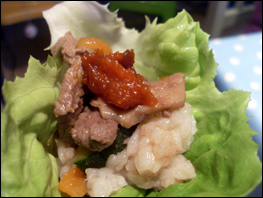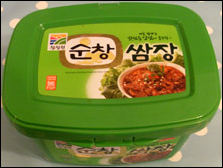|
Uses of Ssamjang SauceSsamjang is a delicious Korean sauce made of gochujang, which is a red chilli pepper paste and doenjang, which is a fermented soy bean paste. It also has a little bit of garlic and some rice wine or some chopped fresh peppers, and definitely plenty of sesame oil. The recipe, like any good food, varies from house to house and is a specialty condiment used in a lot of meals, or even by itself. It can be quite hot, especially when it is homemade by a Korean family that loves spicy food.Ssamjang is a combination of Korean words. Ssam literally means “wrap” and is also the name of a meal of meat and rice wrapped into a leaf that you eat with your hands. Jang means “paste” and together, Ssamjang is used as a condiment for leaf wrapped meats.
The idea is to take a leaf, this can be sesame leaves, Chinese Cabbage or Lettuce, and place a bite sized bit of meat and rice along with some ssamjang and roll it into a ball. This is called a Ssam. You stuff the whole thing in your mouth, as is tradition. Ssamjang is much more versatile, however, and can be used as a dip for fresh vegetables or even as side sauce for meat dishes of any kind. Other ingredients can be added to make Ssamjang special and to suit local tastes. Nuts and seeds can be added, as can tofu or roe. A special kind of ssamjang, called jjukumi ssamjang is stir fried octopus arms mixed with ssamjang. These specialty dishes are exotic to some, but typical to Korean cuisine. You will find commercial applications of ssamjang, in specialty sections of the grocery store or your local Asian market. If you haven't tried it before, don't be afraid!
Together, the ingredients for Ssamjang are a taste sensation. The peppers are hot enough to clear the sinuses and the bean paste is just salty enough to offset the heat that the pepper paste will have. Though these are the two main ingredients, they are not overpowered by each other and still leave enough room for the garlic and soy to blend in nicely with the flavours and accent each bite. It is good on vegetables, but it truly lives up to the origin of its name with a use as a condiment paste. Ssamjang is excellent with a beef and rice mixture wrapped in Sesame leaves, which is a member of the mint family. Ssamjang is truly a traditional Korean creation and a treat for people who have never tried it that enjoy foreign foods. Top of Ssamjang |

